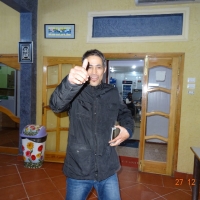 Before we ride to Salahs house, we first follow him to a restaurant to get some food. Due to the meeting in Tripoli earlier that day and the unexpected tour of Leptis Magna we did not eat anything for lunch. A little hungry we park the bikes in front of the restaurant where we are warmly welcomed by Mohammed, a friend of Salah.
Before we ride to Salahs house, we first follow him to a restaurant to get some food. Due to the meeting in Tripoli earlier that day and the unexpected tour of Leptis Magna we did not eat anything for lunch. A little hungry we park the bikes in front of the restaurant where we are warmly welcomed by Mohammed, a friend of Salah.
As soon as we get inside, the boys are directed to the toilet. When I want to follow them, Salah and Mohammed redirect me to the second floor. One of the guys from the restaurant runs after me and hands over a box of tissues. Once upstairs, I realize I am in the secluded area of the restaurant which is especially for the women. It is a large room with plastic tables and chairs and a bathroom in the corner. It is not customary for men and women to enjoy their meals in the same room. When women are travelling, if they can, they usually sit in these areas separated from the men.
Downstairs it appears that it is not a problem for me now to join the guys for dinner. We order spaghetti and couscous and also get salad and a plate of fries. Mohammed and Salah sit at our table and tell us about their views on Libya, the revolution and the security situation. They both express the wish that tourism will flourish and tourists come to Libya to visit Leptis Magna and all the other wonderful things. Again it is clear how proud they are of Libya.
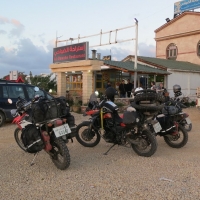 There is so much food on the table that we can only just empty our plates. If Billy has managed to empty his entire plate of spaghetti, Muhammad calls one of the guys from the kitchen. Before he knows it a new full plate of spaghetti is in front of Billy. Although he is trying hard to refuse the second plate of spaghetti, they insist that he accepts it. He had already eaten enough, but he nevertheless attempts to eat all of the spaghetti.
There is so much food on the table that we can only just empty our plates. If Billy has managed to empty his entire plate of spaghetti, Muhammad calls one of the guys from the kitchen. Before he knows it a new full plate of spaghetti is in front of Billy. Although he is trying hard to refuse the second plate of spaghetti, they insist that he accepts it. He had already eaten enough, but he nevertheless attempts to eat all of the spaghetti.
After dinner we are offered tea, after which there is a photo session. Both Salah and Muhammad, and also boys from the kitchen, get their phone to take pictures. We make over 10 group photos.
When we want to pay the bill, we fail to pay all of the food as Muhammad gives us a huge discount. Salah does not want to receive anything for his work as a guide at Leptis Magna either. While we finally walk out the door to the bikes, we are each given a package of chewing gum. It does not stop!
It is dark when we drive to Salahs house on the same busy road on which we drove earlier that day. Salah drives with his hazard lights on so we can not lose sight of him, but at the same time he drives so fast that we can only just keep up with him. There are no street lights along the road and it is very dark. I have my extra lights on in order to spot possible cracks and holes in the road. The moment I put the spotlight off because I am afraid to blind Ross (who rides in front of me) I drive straight through a huge pothole. The light is turned on again!
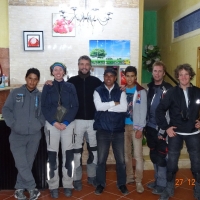 After a while we take a turn, leave the main road en ride onto a dirt road toward some houses. We drive through a metal gate along a small orchard and park our bikes in front of Salahs house. Although the gate will close at night, he asks us to lock the bikes and to get all of our stuff from the bikes. The men are led to the second floor of the building and take all the stuff from the bikes with them. When I want to go in the same direction Salah stops me. It takes a minute before I understand that I am not meant to get upstairs with the guys. I need to stay downstairs with his sister. Even when we say that Peter and I are married and we have no objection against sharing a room with Billy and Ross share, Salah indicates that I should stay with his sister. I follow Salah downstairs towards his sister.
After a while we take a turn, leave the main road en ride onto a dirt road toward some houses. We drive through a metal gate along a small orchard and park our bikes in front of Salahs house. Although the gate will close at night, he asks us to lock the bikes and to get all of our stuff from the bikes. The men are led to the second floor of the building and take all the stuff from the bikes with them. When I want to go in the same direction Salah stops me. It takes a minute before I understand that I am not meant to get upstairs with the guys. I need to stay downstairs with his sister. Even when we say that Peter and I are married and we have no objection against sharing a room with Billy and Ross share, Salah indicates that I should stay with his sister. I follow Salah downstairs towards his sister.
I put my dirty motorcycle boots outside with the other shoes at the door. When the door opens, I enter a large room and meet a small stocky woman. She wears a long skirt, a thick woollen shawl and a black headscarf. She smiles, takes me in and calls the other ladies. From the kitchen two smiling women appear who thoroughly study me. They invite me to sit in a room with a television, that is on loud. The floor is carpeted and along the walls there are several mattresses on which they sit. I am still wearing my dirty bike gear and explain that I would like to change first before I sit down. They ask how I became so dirty. When I explain that I did not arrive in a car but on a bike one of them runs straight to the door to see it. When she is at the door she reports to the other ladies on the motorbike and the men that are standing outside. It is a pity that I do not speak Arabic, because what she said must have been quite funny. The other two ladies are bent with laughter.
Once they have understood that I want to change, one of them calls Salah. He takes me upstairs to the bathroom. It has a lock on the door so I should be able to change clothes there. Once upstairs, the guys tell me that they are going out with Salah. He will take them to a coffee shop. It is immediately clear that this is not an activity for ladies, so I decide to spend the evening with the sister of Salah. We’ll see about sleeping later.
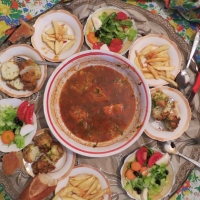 With a clean outfit I walk back into the house on my socks to the TV room. I take a seat on one of the mattresses on the floor. I am given fresh fruit juice and a bowl of chocolates. If I wait to drink until the rest of them also has a drink they look puzzled. Once they understand that I am waiting for them, they make clear that I should not await them. They then stay in the room beside me until the entire glass is empty and I have put at least one chocolate in my mouth.
With a clean outfit I walk back into the house on my socks to the TV room. I take a seat on one of the mattresses on the floor. I am given fresh fruit juice and a bowl of chocolates. If I wait to drink until the rest of them also has a drink they look puzzled. Once they understand that I am waiting for them, they make clear that I should not await them. They then stay in the room beside me until the entire glass is empty and I have put at least one chocolate in my mouth.
Soon thereafter one of the women carries a tray of food inside. On the tray is a large bowl of soup and several small bowls with salad, fried cauliflower and fries. One of the other ladies brings in a plastic bucket and a kettle of hot water which she pours over my hands so I can wash my hands. I am asked to sit with them and eat. I try to make them understand that I have already eaten a delicious spaghetti at Mohammeds restaurant and am not really hungry any more. But no matter how I try, they insist that I eat. One of the ladies pinches my side and makes it clear that she thinks that I am a bit skinny and therefore could use a little food, to the great amusement of the others.
We sit on the floor around the large round bowl with food. The son of eight of one of them also shares our meal. I am given a spoon for the soup and a fork, though I can see right away that they also eat with their hands. They only use their right hand. The left hand is the “dirty hand” and not meant for eating. All of us eat from the same big bowl of soup, dip our bread in it and eat the fries, salad and cauliflower. It is delicious and although I am not really hungry, I do my best to taste everything. I ask if I can take a picture. I am allowed to make a picture, but only of the food and not of them. The captured image again prompts many jokes that I -unfortunately- cannot understand. The fun is not any less.
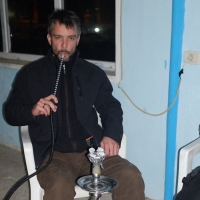 When everyone is finished eating and they also feel that I have eaten enough, the large tray is taken to the kitchen and replaced by a smaller tray with bananas, oranges and tangerines. One of the ladies peel the oranges, while another is peeling peanuts. The third deals with the tea. In the room is a pot of glowing charcoal on which a blackened teapot is sizzling. I keep getting oranges. When I have eaten 2.5 orange I am allowed to stop. Now it is time for tea. It is very strong, very sweet tea and poured in the cups while holding the teapot very high. It is delicious.
When everyone is finished eating and they also feel that I have eaten enough, the large tray is taken to the kitchen and replaced by a smaller tray with bananas, oranges and tangerines. One of the ladies peel the oranges, while another is peeling peanuts. The third deals with the tea. In the room is a pot of glowing charcoal on which a blackened teapot is sizzling. I keep getting oranges. When I have eaten 2.5 orange I am allowed to stop. Now it is time for tea. It is very strong, very sweet tea and poured in the cups while holding the teapot very high. It is delicious.
The rest of the evening we try to talk. The atmosphere is relaxed. The veil of one of them goes off and reveals beautiful dark brown hair. With their very limited English, my three words of Arabic, hands and feet we are able to understand each other a bit. They explain to me how old they are, in what way they are related to each other and show pictures of the other family members. I show pictures of home and explain to them that my mother has passed away. It is clear that cancer is also well known to them because we do not even have to translate it, they understand it right away. When it turns out that my father is still alive the three of them simultaneously raise their finger to indicate that they want to marry him. They are roaring with laughter. They also want to know how it is possible that Peter and I have been together for six years but still have no children. One of them pretends to give a kiss and raises her arms to indicate she does not understand. Another lady asks: “Tablet?”. Yes indeed, a tablet ensures that we do not yet have children. From the approving chuckle that follows I understand that they do not think that is such a bad idea.
After a while they are mostly talking to each other in rapid Arabic. It is unfortunate that I cannot understand them and they do not understand met either. I would really like to know more about them. It seems each one them is a very strong woman with a strong own opinion. I wonder in what way they can express their opinion. And if they work, whether they have seen other parts of Libya or have been in Europe, and much more . At the end of the evening Salah comes back to get me. He tells me that I can share the room with the men. Through Salah I can thank the ladies very much for the nice evening and the delicious food.
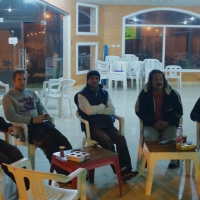 Once upstairs I get full report on the evening out of the men. They first drove to a coffeeshop with Salah in his little Toyota Starlet. They bought coffee in the coffeeshop and then took it to a place next door to drink it with friends of Salah. It apparently was delicious coffee with a liqueur of flowers in it. After the coffee they mingled with the Libyans to smoke a water pipe, Shisha. The evening ended with a game of snooker, Libya against the tourists. During the evening, both Peter and Ross had received several phone calls . Masoud ( from Zuwara ) and Masaud ( from Tripoli) had called to ask if everything was okay and if we had arrived in Khoms and Leptis Magna in good order. Peter was called by Mustafa , a contact in Ajdabiya who asked what day we would be arriving. Everybody is looking after us.
Once upstairs I get full report on the evening out of the men. They first drove to a coffeeshop with Salah in his little Toyota Starlet. They bought coffee in the coffeeshop and then took it to a place next door to drink it with friends of Salah. It apparently was delicious coffee with a liqueur of flowers in it. After the coffee they mingled with the Libyans to smoke a water pipe, Shisha. The evening ended with a game of snooker, Libya against the tourists. During the evening, both Peter and Ross had received several phone calls . Masoud ( from Zuwara ) and Masaud ( from Tripoli) had called to ask if everything was okay and if we had arrived in Khoms and Leptis Magna in good order. Peter was called by Mustafa , a contact in Ajdabiya who asked what day we would be arriving. Everybody is looking after us.
That night we said goodbye to Salah and thanked him for his hospitality, after which we quickly fell asleep. The next morning we woke up early again. Today we would drive from Khoms to Ras Lanuf, a distance of over 360km (223 miles). The route leads through Misrata and Sirte. Sirte is the city where Gaddafi was born and where they finally found and killed him also during the revolution. There had been a lot of fighting in that area during the revolution. Several people advised us not to linger in Sirte and only stop for fuel. On the website of the British Ministry of Foreign Affairs part of the route we would ride was ‘red’, which meant that travel in that area was advised against. The plan was to have breakfast, leave early and ride in one go to Ras Lanuf .
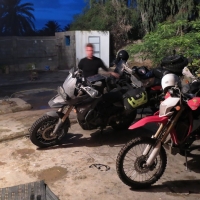 We write a card for Salah to thank him for his hospitality and drive away at 08:30 pm. It is raining. That not only means that we get wet, but also that we get very dirty. The sand that is on the road is now mud, which is raised by the cars and bikes to drive in front of me. Also, the rain that falls does not seem to consist of water only. The clouds in the sky are coloured light pink of the dust that has accumulated in the air. As we drive longer, my visor gets more and more dirty up until the point a do not see anything any more. A large part of the route I ride with my visor open to better see oncoming traffic and potholes. After 100km (62 miles) we stop in Misrata at a convenience store along the way to buy food and drink. We can not only buy bread, toppings and drinks, but also drink espresso. Again, we are warmly welcomed. Not only by the staff but also by customers. When we want to pay the espresso is “on the house”. The guy then runs out to give us chairs so we can sit down to have breakfast. Another guy hands over the garden hose so we can clean our helmets. We just keep meeting friendly people.
We write a card for Salah to thank him for his hospitality and drive away at 08:30 pm. It is raining. That not only means that we get wet, but also that we get very dirty. The sand that is on the road is now mud, which is raised by the cars and bikes to drive in front of me. Also, the rain that falls does not seem to consist of water only. The clouds in the sky are coloured light pink of the dust that has accumulated in the air. As we drive longer, my visor gets more and more dirty up until the point a do not see anything any more. A large part of the route I ride with my visor open to better see oncoming traffic and potholes. After 100km (62 miles) we stop in Misrata at a convenience store along the way to buy food and drink. We can not only buy bread, toppings and drinks, but also drink espresso. Again, we are warmly welcomed. Not only by the staff but also by customers. When we want to pay the espresso is “on the house”. The guy then runs out to give us chairs so we can sit down to have breakfast. Another guy hands over the garden hose so we can clean our helmets. We just keep meeting friendly people.
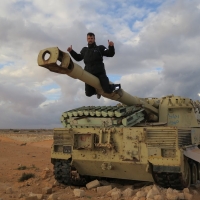 In the course of the day the sky clears. We drive past the desert and regularly spot camels along the way. Even at a gas station we see a camel, this time in the back of a pickup. We also pass huge oil refineries and see on the map how much oil pipes run from the desert to the coast.
In the course of the day the sky clears. We drive past the desert and regularly spot camels along the way. Even at a gas station we see a camel, this time in the back of a pickup. We also pass huge oil refineries and see on the map how much oil pipes run from the desert to the coast.
In this part of the country it is clearly visible that there was heavy fighting here during the revolution. Houses are shot, burned or collapsed. There are holes in the asphalt that are clearly caused by exploded grenades. In the afternoon Ross suddenly turns right, while pointing at a huge tank. at the side of the road. We all ride to the tank to check it out. The tires were broken, but other than that the tank was still in pretty good condition, even the engine was still in it. An impressive sight and tangible evidence of the revolution.
At the end of the afternoon we arrive in Ras Lanuf, a compound of an oil company. On the compound there should be a hotel where we can stay. We are registered by the security guards and taken to the hotel. We park the bikes in front of the door of the hotel. Billy, Ross and I go inside, while Peter remains with the bikes. The people at the reception desk are less friendly than we had experienced so far in Libya. First they said they are full. After a while it turns out they do have one room, but that we cannot share that room. Then it appears that they might have two rooms , but no dinner or breakfast . The price per room is 160 Libyan Dinar (€ 94) , which would mean all our cash would be gone in one go. Just as we are discussing whether we could make it to Ajdabiya in daylight Peter walks in with a man he had met on the parking outside. He introduced himself as Abdul Hamid and asks “Problem?”.
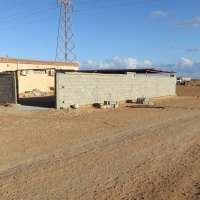 As soon as Abdul Hamid understands how expensive the hotel is, he offers us to stay with him. He lives with his wife and three children just outside Ras Lanuf. He says that we can safely park the bikes at his house and that he has enough room for all of us. We decide to take a chance and follow Abdul Hamid onto a sandy road in the desert to his house. He points to the homes in the area and says that all the houses are owned by his relatives. We park the bikes in the courtyard. He opens the doors of his house and welcomes us warmly. We have two rooms and before we know it in both rooms are mattresses, pillows and blankets. We can also use his shower. His wife and children are not at home yet, but Abdul Hamid will pick them up later.
As soon as Abdul Hamid understands how expensive the hotel is, he offers us to stay with him. He lives with his wife and three children just outside Ras Lanuf. He says that we can safely park the bikes at his house and that he has enough room for all of us. We decide to take a chance and follow Abdul Hamid onto a sandy road in the desert to his house. He points to the homes in the area and says that all the houses are owned by his relatives. We park the bikes in the courtyard. He opens the doors of his house and welcomes us warmly. We have two rooms and before we know it in both rooms are mattresses, pillows and blankets. We can also use his shower. His wife and children are not at home yet, but Abdul Hamid will pick them up later.
The rest of the afternoon we hang out in the TV-room. One of the channels shows non-stop English movies. Ross continues his Arabic course with Abdul Hamid and again writes all newly learned words in his brown book. We meet Ali, a cousin of Abdul Hamid and also his neighbour. Ali hands me a packet of tea and says it is really good tea. He insists that I open the package and smell it. After I have done that and have confirmed that it smells nice, I want to give him the tea again. But then he says: “Make tea, you make tea.” Abdul Hamid hears what Ali says and as he lies on the floor watching TV then points to the kitchen: “Yes you make tea.” I am a bit stunned. For Ali and Abdul Hamid it clearly is a most natural thing that I, the woman in the company, make tea. If I am going about this slight culture shock, I go into the kitchen in search of water, a teapot and glasses. Abdul Hamid comes in to help me searching, but he does not seem to find them. This is clearly not his domain. I do see the fun of it and eventually make a lovely pot of tea for Billy and myself.
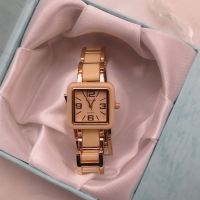 Ali then asks me to accompany him to his house to meet his wife. As a woman, I have the privilege to do so. He would not introduce his wife to Peter, Billy and Ross. I get a tour around their modest house. Ali speaks limited English and it is very difficult to have a normal conversation. At some point he says that he and his wife are in the same situation as Peter and I because they are also together for six years but, like us, have no children. It is clear that the reason we do not have children is very different than the situation of Ali and his wife, but I realize at the same time that this time the language barrier and perhaps also the cultural difference make it impossible of explaining the real reason. Difficult.
Ali then asks me to accompany him to his house to meet his wife. As a woman, I have the privilege to do so. He would not introduce his wife to Peter, Billy and Ross. I get a tour around their modest house. Ali speaks limited English and it is very difficult to have a normal conversation. At some point he says that he and his wife are in the same situation as Peter and I because they are also together for six years but, like us, have no children. It is clear that the reason we do not have children is very different than the situation of Ali and his wife, but I realize at the same time that this time the language barrier and perhaps also the cultural difference make it impossible of explaining the real reason. Difficult.
They then ask me to take a seat in the living room so Ali can take a picture of me and his wife. His wife gets up and she grabs a box off a shelf. She gives it to me and says something in Arabic to Ali. Ali says that it is a good custom of Libyans and Muslims to give a present to a woman when she visits a home for the first time. When I open it there is a gold coloured watch in it with white stones. I do not know what to say. I do not really want to accept it and explain that it is too big a gift. But they insists that I keep it. When I wear it when I am back in the Netherlands I will think of them. I thank them extensively for the watch and are taken to the house of Abdul Hamid again by Ali.
At the beginning of the evening Ali enters with two large plates with food. Peter and I can eat from the same plate, but it is not good use for me to eat with the other guys. Therefore, there is a separate plate for Peter and me and one for Billy, Ross and Abdul Hamid. We eat delicious rice with some meat and salad.
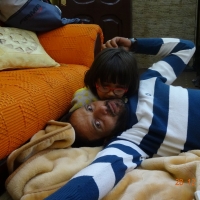 After dinner Abdul Hamid takes Billy and Ross to Ras Lanuf to go to the supermarket and to pick up his wife and children. After some time Billy and Ross come back accompanied by the brother of Abdul Hamid, Rahim. Ross tells about their adventures on the way. When they got into Abdul Hamids new Toyota Hilux, Abdul Hamid placed his Kalashnikov in Ross’ lap. Abdul Hamid explained that in the evening many robberies take place by ‘Ali Baba’ and that they mainly steal new Toyota pickups. Because there is no police force set up after the revolution it is every man for himself. The Kalashnikov is the defence. As a precaution they do not stop for any red lights either. Abdul Hamid, Ross and Billy first drive in one go to the secure compound to do some shopping. There Abdul Hamid swapped his new Toyota Hilux with the old beaten car of his brother Rahim. Rahim then took the Toyota with Ross and Billy back home again in one go, while Abdul Hamid went to pick up his wife and children in the old car. Not common practice for us, but apparently the most normal thing in the world of Abdul Hamid and Rahim.
After dinner Abdul Hamid takes Billy and Ross to Ras Lanuf to go to the supermarket and to pick up his wife and children. After some time Billy and Ross come back accompanied by the brother of Abdul Hamid, Rahim. Ross tells about their adventures on the way. When they got into Abdul Hamids new Toyota Hilux, Abdul Hamid placed his Kalashnikov in Ross’ lap. Abdul Hamid explained that in the evening many robberies take place by ‘Ali Baba’ and that they mainly steal new Toyota pickups. Because there is no police force set up after the revolution it is every man for himself. The Kalashnikov is the defence. As a precaution they do not stop for any red lights either. Abdul Hamid, Ross and Billy first drive in one go to the secure compound to do some shopping. There Abdul Hamid swapped his new Toyota Hilux with the old beaten car of his brother Rahim. Rahim then took the Toyota with Ross and Billy back home again in one go, while Abdul Hamid went to pick up his wife and children in the old car. Not common practice for us, but apparently the most normal thing in the world of Abdul Hamid and Rahim.
After some time Abdul Hamid came back with his wife and children. He led his wife directly past the TV room inside the house and closed the door to the rest of the house. Again, it is only possible for me to meet his wife. Peter , Billy and Ross are not introduced to her and will not even meet her in the house. The rest of the evening Abdul Hamid sits with us and tells about the revolution, “Ali Baba” and his job. His two eldest children, a girl of six and a boy of four sit with us as well. When he has shown his Kalasnikov to us he asks the girl to safely store the weapon. A special sight how the little girl lifts the heavy gun with two hands to store it away. Almost surreal.
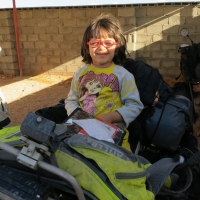 The next morning we are first invited for a full breakfast, with bread, eggs, coffee and juice before we can leave. When I am still packing my bike Abdul Hamid walks up to me with a plastic bag. He hands over a gift his wife wants to give me. The bag holds a pair of jeans and a t-shirt. I thank the wife of Abdul Hamid and put the stuff in my bag.
The next morning we are first invited for a full breakfast, with bread, eggs, coffee and juice before we can leave. When I am still packing my bike Abdul Hamid walks up to me with a plastic bag. He hands over a gift his wife wants to give me. The bag holds a pair of jeans and a t-shirt. I thank the wife of Abdul Hamid and put the stuff in my bag.
When we leave, Ali and Abdul Hamid first take us to a petrol station about twenty kilometres from their houses. If we want to pay Abdul Hamid steps forward and pays for the benzine. After we have thanked him extensively, we continue our way to Ajdabiya .
Part III on Libya, with a report from Ajdabiya to the Libyan border will follow soon.





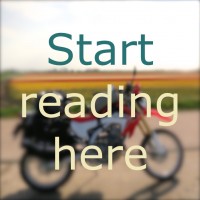
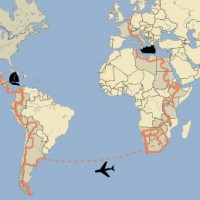
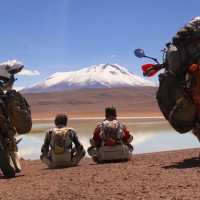
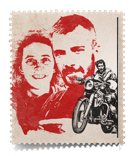
leuk om ook dit weer te lezen , ik ben verbaast over de gastvrijheid waarmee jullie overal ontvangen worden. Goed geschreven ook echt een plezier om te lezen.
Leesvoer!!! Thanks!
Heel bijzonder wat jullie meemaken bij de mensen thuis. Wat een gastvrijheid. Volgens mij dingen die je meemaakt dankzij het reizen per motor, en natuurlijk ook omdat jullie zo’n aardige mensen zijn
Oooh wat een mooie verhalen om te lezen! Echt het werkt verslavend… Steeds weer kijken of er een nieuw bericht is! Wat een bijzondere avonturen maken jullie mee en ontmoeten jullie lieve mensen! Hilarisch die foto van die dromedaris in die pick-up!
Liefs Carina
Geweldig dat jullie de tijd nemen om alles zo nauwkeurig te beschrijven. De trouwe volgers in Breda wachten weer in spanning op de volgende aflevering! Peter & Lill
Wat is er goed voor jullie gezorgd in Libië. Hele bijzondere en mooie ervaringen. Dank je wel dat we ervan mee mogen genieten. We kijken alweer uit naar het volgende verhaal.
We willen jullie ook nog een heel gelukkig, gezond en voorspoedig Nieuwjaar wensen. Liefs van Albert en Janny
Far out. Great story and trip so far. Good luck on the rest. Grtz. Erik